
Early Detection Pregnancy Tests: How Do They Work?
Pregnancy is a transformative journey that begins with the union of an egg and sperm. As the fertilized egg implants in the uterus, it triggers a cascade of hormonal changes that prepare the body for the growth and development of a new life. One of the earliest signs of pregnancy is the production of human chorionic gonadotropin (hCG), a hormone secreted by the developing placenta.
Early detection pregnancy tests are designed to detect the presence of hCG in urine or blood, providing a reliable indication of pregnancy as early as 10-12 days after conception. These tests have revolutionized the way we confirm pregnancy, allowing individuals to know their status with greater accuracy and convenience.
Types of Early Detection Pregnancy Tests
There are two main types of early detection pregnancy tests:
- Urine tests: These are the most common type of pregnancy test, available over-the-counter at pharmacies and drugstores. They involve collecting a urine sample and dipping a test strip into it. The test strip contains antibodies that bind to hCG if it is present in the urine. A positive result is indicated by the appearance of a colored line or symbol.
- Blood tests: Blood tests are performed in a laboratory setting and are generally more sensitive than urine tests. They measure the exact amount of hCG in the blood, providing a quantitative result. Blood tests can detect pregnancy even earlier than urine tests, as hCG levels rise more rapidly in the blood.
How Early Detection Pregnancy Tests Work
Early detection pregnancy tests work by detecting the presence of hCG in urine or blood. hCG is a glycoprotein hormone produced by the placenta after the fertilized egg implants in the uterus. It is responsible for maintaining the corpus luteum, which produces progesterone to support the early stages of pregnancy.
The amount of hCG in the body increases rapidly during the first few weeks of pregnancy, doubling every 2-3 days. This rapid increase makes it possible to detect hCG in urine or blood as early as 10-12 days after conception.
Accuracy of Early Detection Pregnancy Tests
Early detection pregnancy tests are highly accurate when used correctly. However, it is important to note that no test is 100% foolproof.
- False positives: False positives can occur when the test detects hCG in the absence of pregnancy. This can be caused by certain medications, such as fertility drugs, or by rare medical conditions.
- False negatives: False negatives can occur when the test fails to detect hCG in the presence of pregnancy. This can happen if the test is used too early or if the urine sample is diluted.
When to Take an Early Detection Pregnancy Test
The best time to take an early detection pregnancy test is after you have missed your period. However, some tests can detect pregnancy as early as 10-12 days after conception. If you suspect you may be pregnant, it is recommended to wait until after your missed period to take a test for the most accurate results.
Interpreting Early Detection Pregnancy Test Results
Most early detection pregnancy tests display a colored line or symbol to indicate the result. A positive result is typically indicated by the appearance of two lines or symbols, while a negative result is indicated by the appearance of one line or symbol.
If you are unsure about the results of your pregnancy test, it is recommended to consult with a healthcare professional for confirmation.
Limitations of Early Detection Pregnancy Tests
While early detection pregnancy tests are highly accurate, they do have some limitations:
- They cannot determine the exact time of conception.
- They cannot detect ectopic pregnancies.
- They cannot predict the outcome of a pregnancy.
Conclusion
Early detection pregnancy tests are a valuable tool for confirming pregnancy and providing individuals with peace of mind. By detecting the presence of hCG in urine or blood, these tests allow individuals to know their status with greater accuracy and convenience. However, it is important to use these tests correctly and interpret the results carefully. If you have any questions or concerns about your pregnancy test results, it is always recommended to consult with a healthcare professional.